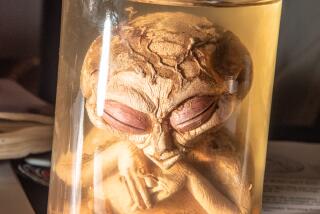The Paranormal’s Now a Norm on TV
- Share via
Aliens, ghosts, vampires, monsters, faith healers, psychic phenomena: Inherently dramatic subjects, they’ve all been explored and exploited by television over the last four decades.
But it’s doubtful that paranormal-related programming has ever been more visible than it is today.
The recent mainstream success of Fox’s supernatural series “The X-Files” has helped unleash a flood of programming surrounding the unexplained. There are nearly a dozen TV series with otherworldly orientations currently being aired. Fox unveiled a vampire-themed series, “Kindred: The Embraced,” earlier this month, and last month UPN kicked off “The Paranormal Borderline,” a magazine show featuring supposedly authentic tales of paranormal encounters.
And on Sunday, Showtime premieres “Poltergeist: The Legacy,” a dramatic series about a secret society that combats mysterious evil forces.
“They’re all over the place,” says filmmaker Denise Dilanni, whose recent documentary for the PBS science series “Nova” explored and questioned alien abduction claims. “Several months ago, I noticed that ‘ER’ and ‘Chicago Hope,’ two serious medical shows, both had plot lines of a woman who presents the emergency room with an alleged [alien pregnancy]. Then there’s ‘The X-Files,’ ‘Sightings’ and the new comedies and all the books being written [about the paranormal]. . . . Fortunes are being made off this stuff.”
To Mack Anderson, co-executive producer of “The Paranormal Borderline,” the explosion of these types of programs reflects a much greater openness in mainstream society to the possible existence of paranormal occurrences. He says this attitude is partly fueled by what he sees as the many credible witnesses who have come forward with stories of strange encounters.
“We interviewed Gordon Cooper,” Anderson says. “He’s the Mercury astronaut and the character in [Tom Wolfe’s book] ‘The Right Stuff.’ He told us stories of his encounters with UFOs that, if you put them on ‘The X-Files,’ you wouldn’t believe. I’m not talking about two guys with no teeth in a swamp; I’m talking about a true American hero.”
To some, interest in the paranormal reflects a growing disenchantment with conventional science and religion.
“Science should give people hope and optimism,” says Michio Kaku, a professor of theoretical physics at the City University of New York and the host of a science-oriented radio show in New York. “That’s not the message coming from established science. Instead the message is, ‘Here are more pesticides for shinier apples.’ These [paranormal shows] aren’t all bad. There’s a lot of hokum and quackery out there; however, there is also a message of hope.”
But the glut of paranormal programming has dismayed some empiricists such as Paul Kurtz, the chairman of the Amherst, N.Y.-based Committee for the Scientific Investigation of the Claims of the Paranormal, a scientific and educational organization highly skeptical of paranormal claims. He is also a philosophy professor at the State University of New York at Buffalo.
Kurtz, part of a group being formed to monitor television shows with supernatural designs, believes these types of programs--whether in the form of newsmagazines or dramas--are contributing to scientific illiteracy in America. To him, this trend is yet another example of the tabloidization of TV, which he believes tends to blur the line between fact and fiction.
“If we’re turning out people who can’t distinguish pseudo-science from science, that undermines a whole level of thought and judgment in this country,” Kurtz argues. “Particularly in a democracy, people have to be able to make intelligent judgments. . . . These shows should be labeled like cigarettes: ‘This is only entertainment.’ A lot of people believe this [material] because it’s on television.”
Filmmaker Dilanni was prompted to make a documentary on alien abductions largely because the subject was attracting increased public interest and belief, yet few in the media were willing to explore the matter with depth and objectivity. Among other findings, her investigation presented the possibility that the memories of some alleged abductees may have been distorted during hypnotic regression.
Indeed, paranormal magazine shows such as the syndicated, quasi-journalistic “Sightings” and the more sensationalistic “The Paranormal Borderline” are hardly hard-hitting investigative programs. But “Sightings” co-executive producer Ann Daniel says paranormal activities like hauntings tend to exist outside of the traditional boundaries of science and thus maintains that it is unrealistic for critics to always expect hard evidence.
“We do try to involve people who are experts in various fields,” Daniel says. “When you’re dealing with the paranormal, you’re dealing with experiences that are very hard to scientifically test. When it’s possible, we present that information. But many times it’s not possible. It’s like trying to scientifically prove an emotion. You have an emotion but how do you prove you have an emotion?”
Daniel insists that “Sightings,” which covers everything from UFO encounters to healing miracles and Bigfoot, tries to uphold a high level of honesty and objectivity. During a recent film shoot, one of the show’s producers discovered that the ghostly activity in a home was actually being caused by its human residents. The story was immediately dropped.
Yet producers Daniel and Anderson admit that their shows are presented in part as entertainment. Dramatic reenactments are often shot in ways to maximize feelings of fear or mystery, and eerie music is the norm.
“We want to bring people into our tent and tell them scary stories,” says “The Paranormal Borderline’s” Anderson. “But what makes them scary is the belief that these people are telling the truth.”
Chris Carter, creator and executive producer of “The X-Files,” dislikes his series being associated with paranormal magazine programs like “Sightings,” which he terms “kitschy.” He says he was upset when Fox (which was then producing both shows) briefly paired the two several summers ago.
Carter believes his show’s success has much more to do with its involving and innovative storytelling and characters than its unearthly content. “The X-Files” involves two FBI agents who investigate paranormal matters. But the show’s portrayal of aliens is often subtle and shrouded in mystery.
“I honestly don’t believe the hardest-core UFO [buffs] maintain any central position in our audience,” says Carter, a paranormal skeptic. “They are actually upset sometimes because the show isn’t [involved enough with] UFOs and extraterrestrials.”
Richard B. Lewis, creator and co-executive producer of “Poltergeist: The Legacy,” says his drama is being presented largely as a morality tale. He strongly disagrees with blanket condemnations of shows with paranormal themes.
“We have a group of heroes who are fighting evil,” he says. “What’s wrong with that?”
“Who’s harmed by good storytelling?” Anderson says in agreement. “I don’t think [paranormal shows] can be construed as harmful. I see a lot of stuff on television that degrades humans a lot more.”
* “Poltergeist: The Legacy” premieres Sunday night at 8 and 10:20 on Showtime.
* “Sightings” airs Saturdays at 6 p.m. on KTTV-TV Channel 11.
* “The Paranormal Borderline” airs Tuesdays at 9 p.m. on UPN (Channel 13).
* “The X-Files” airs Fridays at 9 p.m. on Fox (Channel 11).
More to Read
The complete guide to home viewing
Get Screen Gab for everything about the TV shows and streaming movies everyone’s talking about.
You may occasionally receive promotional content from the Los Angeles Times.






